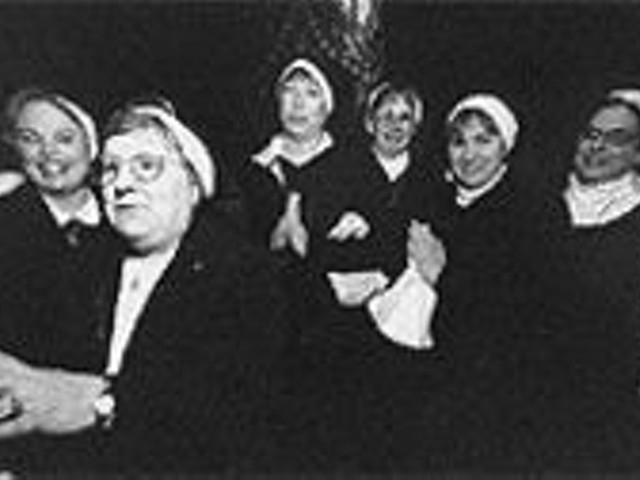At the top of the show, we meet Karen and Peggy, apparently two old friends out for dinner. After all, who but an old friend would put up with Karen's energetic ravings about life equaling death and the premise that hope is an illusion? Within minutes, though, we learn it's not friendship that has brought these two women together. Rather, Peggy's husband, Jack, has had a one-night fling with the younger Karen (after a decades-long obsession), and Peggy has decided to confront her over dinner. What follows is a hilarious, moving, honest and quirky play that showcases a remarkable couple of actresses, Peggy Cosgrave and Karen Radcliffe, in roles written and named for them.
Although the premise of a wronged wife confronting the other woman may sound contrived or out of a '50s melodrama, the play is anything but predictable and the story impossible to summarize, never standing still for a moment. The postdinner evening takes the women on a journey, of course, but one full of left turns. It seems Karen isn't at all interested in Peggy's husband but is obsessed with a co-worker, Stanley, who so far hasn't acknowledged her advances. This is meant to comfort Peggy but only enrages her. Her life has been turned upside down for a one-night fling? Dinner turns into drinks at a bar, where Peggy runs into an old flame (Ed Vaughan, who plays all the men in the play), which leads to an impromptu fishing trip. All the while, Karen rants about regret, love, her theories of overpopulation and of boredom as the prime human motivator, and Peggy noisily comes to terms with her past and her own life changes.
Both actresses are excellent, no doubt freed and inspired by the opportunity to create characters written for them, and one can't imagine any other interpretations. Radcliffe's Karen is an intelligent, insecure person whose philosophizing is full of sharp and funny observations that go by too quickly; we're still getting our ears around one while another flies by. She has overanalyzed every aspect of her own life but has failed to see its effect on others. When she realizes what she has "stolen" from Peggy, at the end of Act 1, the writing, directing and acting all come together in a breathtaking moment. By the end of the play, Karen has given up the notion that life is death; she decides to go with the premise that life is life, come what may.
As Peggy, Cosgrave is a different kind of dynamo, all emotion and impulse, the kind of woman who drives her Mercedes while listening to Meat Loaf. She is slightly older than both her husband and Karen and is feeling the effects of it, questioning all the choices she's made, the "roads not open," as she misremembers the poem. Cosgrave makes every beat of Peggy's emotional roller-coaster ride believable and enjoyable, and her final confrontation with her husband is wonderfully poignant.
As the various men -- a waiter, Peg's old boyfriend, Stanley and, finally, the unfaithful Cyclops of a husband -- Vaughan is amazing. He's a big bear of a man, a physical type not usually associated with chameleonic acting transformations. Yet each of his characters makes you forget it's the same actor. His neurotic Stanley is miles away from the philandering Jack, whom Vaughan makes understandable if not forgivable. The scene in which Stanley and Karen discover their shared misanthropy is a delight. Vaughn is helped in his characterizations by Dorothy Marshall Englis' simple but defining costumes; her choices for the actresses, limited to one costume each for the evening, are equally appropriate. The set, designed by Dunsi Dai, is at its best in the exterior scenes; a lovely star-filled backdrop and magical lighting by Peter E. Sargent help create a lovely moonlit lakeside in the tiny Studio space.
St. Louis audiences have been treated lately to works that examine the emotional details of human behavior in a painfully honest way, like Women Who Steal and the Black Rep's Jitney. This is theater at its best: plays full of ideas, yes, but first and foremost about people, the way they interact and the stupid and sad things they do in defense of their sometimes indefensible ideas. August Wilson and Carter W. Lewis are descendents of Chekhov; on the more cerebral side of the family is George Bernard Shaw, represented upstairs at the Rep with Major Barbara. His characters, no matter how witty or cleverly drawn, never take on flesh, never seem to ache or sweat or suffer from the inability to express the inexpressible. (To Shaw, if it can't be expressed, it isn't worth talking about anyway.) No matter which character is speaking, we always know we're hearing Shaw's ideas, ad infinitum, on whatever the Big Premise of the play is. Although there is a place for theater like this (upstairs, where the subscribers expect it), thank goodness the Rep also finds a place for the occasional "minor" piece about love, regret, the need to feel special and the heartbreaking, comical and poetic ways people screw up their lives and try to put them back together. These things may not be big in the Shavian sense, but they're what most people deal with every day. In his director's notes (which are as funny and personal as his play), Lewis talks about the "human detail" he tries to put on the stage in an honest way that we can all recognize. He and his cast have succeeded wildly and are most welcome here.





